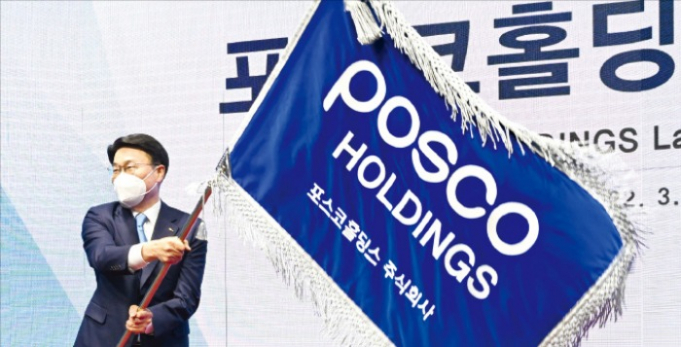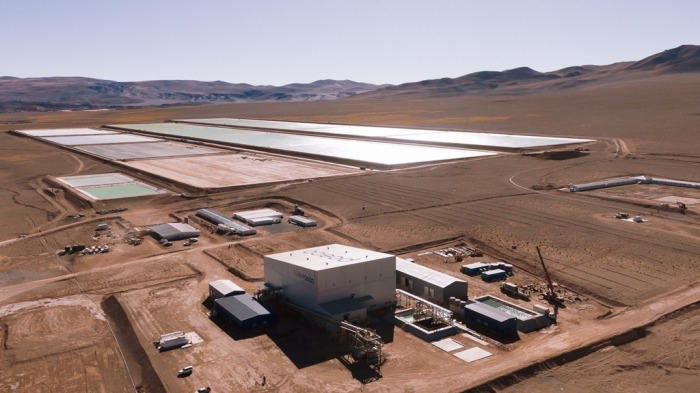Steel
POSCO sees battery materials sales double by 2030
The steelmaker advanced into the silicon anode material market after acquiring a Korean startup
By Jul 06, 2022 (Gmt+09:00)
2
Min read
Most Read
LG Chem to sell water filter business to Glenwood PE for $692 million


Kyobo Life poised to buy Japan’s SBI Group-owned savings bank


KT&G eyes overseas M&A after rejecting activist fund's offer


StockX in merger talks with Naver’s online reseller Kream


Mirae Asset to be named Korea Post’s core real estate fund operator



South Korea’s POSCO Holdings Inc. expects sales of its rechargeable battery materials to more than double to 41 trillion won ($31 billion) by 2030, after it branched out into the market of silicon anode materials used in lithium-ion batteries.
Its 2030 target of 41 trillion won in battery materials sales compares with the estimated 20 trillion won in 2026, excluding valuation gains from its stakes in overseas mines, according to its regulatory filing on Tuesday.
"Our steel-heavy business structure left our share price vulnerable to the steel market conditions," the company’s President Chon Jung-son said at its 2022 value day for the rechargeable energy material business.
“To put an end to such patterns, we will focus on new growth areas such as EV battery materials and hydrogen energy.”
The regulatory filing was released simultaneously with the Value Day event.
Last May, a senior POSCO executive told The Korea Economic Daily that its battery business alone is expected to generate 9 trillion-10 trillion won in operating profit by 2030, matching the company's overall operating profit of 9.24 trillion won in 2021.

SILICON ADNODE MATERIALS
On July 1, POSCO agreed to take over 100% of Tera Technos, a domestic manufacturer of silicon-based anode materials for an undisclosed sum.
The acquisition helps the steel giant advance into the new segment of anode materials and eventually reduce its dependence on Chinese battery material suppliers, POSCO Holdings Vice President Yoo Byeong-og said in a statement.
A silicon anode is considered a next-generation anode electrode. Compared with the graphite-based anodes used in most lithium-ion batteries, silicon anodes have a higher capacity, efficiency and stability than conventional anode electrodes.
POSCO expects the silicon anode market to grow by an average of 39% by 2030, with silicon-based anode materials likely to be embedded into about one-fourth of EV batteries produced in 2030 from the current level of less than 5%, according to POSCO.
POSCO Holdings aims to become the world’s top EV battery materials supplier by 2030, by when it expects its parent group’s corporate value to more than treble.
The steel giant is the only company in the world that has built an EV battery value chain from raw materials such as lithium, nickel and graphite to battery materials, including cathode and anode electrodes as well as precursors.
| POSCO's production plans for battery materials (Unit: thousand tons) | ||
| 2026 | 2030 | |
| Cathode | 425 | 605 |
| Anode | 178 | 322 |
| Lithium | 130 | 300 |
| Nickel | 155 | 220 |
Write to Jeong-Min Nam at peux@hankyung.com
Yeonhee Kim edited this article
More to Read
-
 BatteriesPOSCO Chemical, Britishvolt sign initial deal for battery materials
BatteriesPOSCO Chemical, Britishvolt sign initial deal for battery materialsJun 30, 2022 (Gmt+09:00)
1 Min read -

-
 BatteriesPOSCO, GM JV inks battery materials supply deal worth $16 bn
BatteriesPOSCO, GM JV inks battery materials supply deal worth $16 bnMay 27, 2022 (Gmt+09:00)
2 Min read -
 Corporate investmentPOSCO Group looks to treble corporate value by 2030
Corporate investmentPOSCO Group looks to treble corporate value by 2030May 26, 2022 (Gmt+09:00)
1 Min read -
 BatteriesPOSCO to invest $20 billion in battery materials to rival Chinese firms
BatteriesPOSCO to invest $20 billion in battery materials to rival Chinese firmsMay 11, 2022 (Gmt+09:00)
3 Min read
Comment 0
LOG IN


